residential swimming pool regulations massachusetts pdf
Overview of Residential Swimming Pool Regulations in Massachusetts
Massachusetts enforces a comprehensive framework for residential swimming pools, covering permits, safety standards, and environmental considerations to ensure compliance with local building, plumbing, and electrical codes.
Massachusetts swimming pool regulations are designed to ensure safety, environmental protection, and legal compliance. These rules govern the installation, maintenance, and modification of residential pools. They include requirements for permits, inspections, and adherence to specific safety and design standards. The regulations apply to all types of pools, including in-ground, above-ground, and semi-public pools, ensuring they meet local building, plumbing, and electrical codes. Compliance is essential to avoid penalties and ensure safe enjoyment of residential pools.
Classification of Pools: Private, Public, and Semi-Public
Massachusetts classifies swimming pools into three categories: private, public, and semi-public. Private pools are for individual or family use, while public pools are open to the general public. Semi-public pools serve specific groups, such as hotel guests or condominium residents. Each classification has distinct regulatory requirements, ensuring safety and compliance with local building and health codes. Proper classification is essential for determining applicable permits and inspections.
Permits and Approvals
A permit is required for residential pool installation, alteration, or enlargement. Licensed electricians must obtain permits before pool permits are issued, ensuring compliance with local codes.
General Permit Requirements for Pool Installation
A permit is required for the installation, alteration, or enlargement of residential swimming pools. Applications must comply with local building codes, and a licensed electrician must obtain necessary permits. Pool permits cannot be issued without prior electrical approval. Property owners must submit detailed plans and specifications for review. Inspections may be required to ensure compliance with safety and structural standards before final approval is granted.
Electrical Permits: Role of Licensed Electricians
A licensed electrician must obtain a permit before a pool permit can be issued. This ensures compliance with electrical safety standards. The electrician is responsible for installing pool-related electrical systems, including wiring and equipment. Inspections are required to verify adherence to local codes. This process ensures the safety of the pool’s electrical components and protects against potential hazards. Compliance with these requirements is mandatory for residential pool installations in Massachusetts.
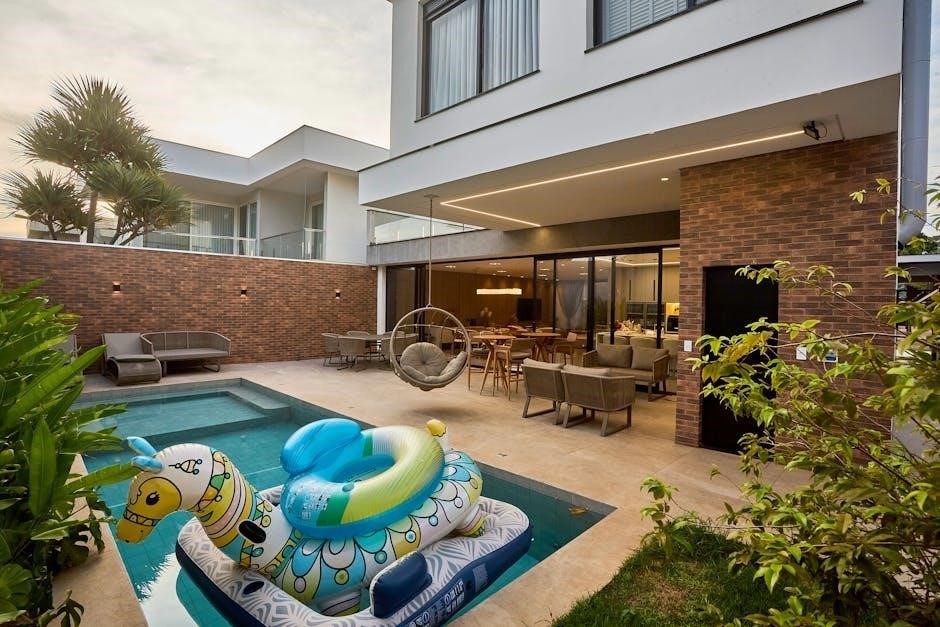
Fencing and Barrier Requirements
Residential pools must be enclosed by barriers complying with Massachusetts safety codes, ensuring secure fencing to prevent unauthorized access and enhance safety around the pool area.
Minimum Fencing Specifications
Massachusetts requires residential pools to have fencing at least 4 feet high, with self-latching gates. Fences must be sturdy, non-climbable, and free from gaps. Specific detailing ensures safety, preventing accidental drownings, and compliance with local building codes.
Design and Safety Standards for Pool Barriers
Massachusetts mandates strict design and safety standards for pool barriers to prevent accidents. Barriers must be maintained free from pollution sources like dust or drainage. Design controls ensure compliance with safety codes, while exceptions exist for pools equipped with power safety covers, eliminating the need for traditional fencing under specific conditions.

Location and Setback Requirements
Residential pools in Massachusetts must be set back at least ten feet from property lines and properly drained to prevent nuisance conditions for neighboring properties.
Minimum Setback from Property Lines
Residential swimming pools in Massachusetts must be set back at least ten feet from both side and rear property lines. This requirement ensures proper drainage and prevents potential nuisance conditions for neighboring properties. Local ordinances may vary, so homeowners should consult their municipality for specific regulations. The setback ensures safety and maintains aesthetic standards, aligning with state and local building codes.
Pool Placement and Drainage Considerations
Residential swimming pools must be located to avoid pollution from dust, smoke, or surface drainage. They should not create nuisances for neighboring properties. Proper drainage systems are required to prevent water accumulation and ensure environmental safety. Pools must be placed in a manner that aligns with local building codes and regulations, ensuring compliance with health and safety standards. This includes avoiding areas prone to waterlogging or contamination.
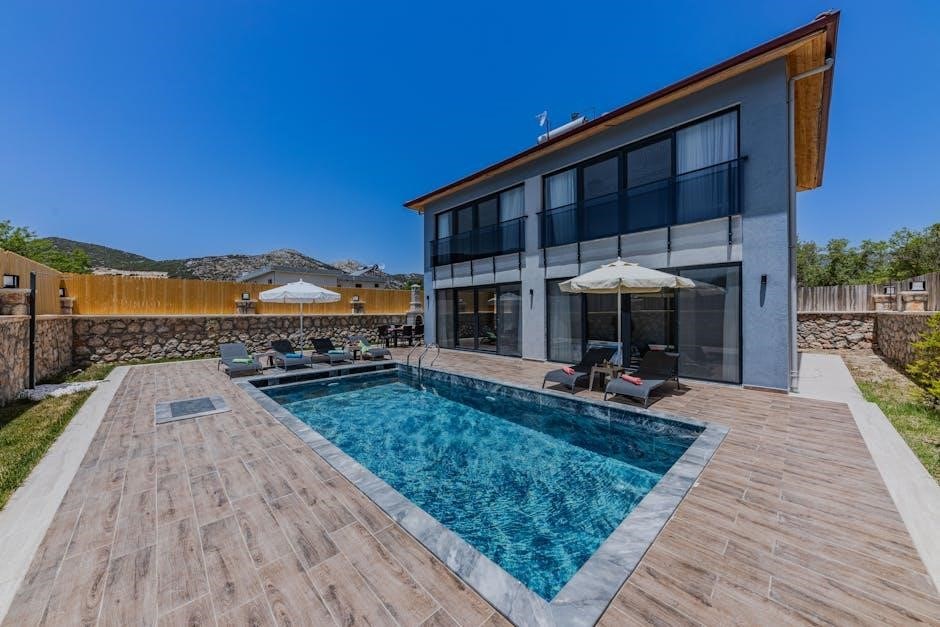
Electrical and Plumbing Compliance
Residential pools in Massachusetts must meet specific electrical and plumbing codes. Licensed professionals ensure proper wiring, grounding, and water system connections for safety and regulatory compliance.

Electrical Safety Standards for Pools
Residential swimming pools in Massachusetts must adhere to strict electrical safety standards; A licensed electrician is required to obtain a permit before pool installation. All electrical equipment, including pool pumps and lighting, must comply with the Massachusetts State Building Code, specifically Appendix G, Section AG 105. Proper grounding and bonding are essential to prevent electrical hazards. Regular inspections ensure compliance with safety regulations to protect users and property.
Plumbing Requirements for Residential Pools
Residential pool plumbing in Massachusetts must meet specific standards to ensure safe and efficient operation. Pools require approved materials for pipes and fittings, proper drainage systems, and backflow prevention devices. The installation must comply with local plumbing codes and be inspected for leaks and cross-connections. Additionally, all pool plumbing connections to potable water supplies must adhere to health and safety regulations to prevent contamination and ensure system integrity.
Inspections and Compliance
Residential pools in Massachusetts require pre-installation inspections and annual permit renewals to ensure compliance with safety and regulatory standards, enforced by local building departments.
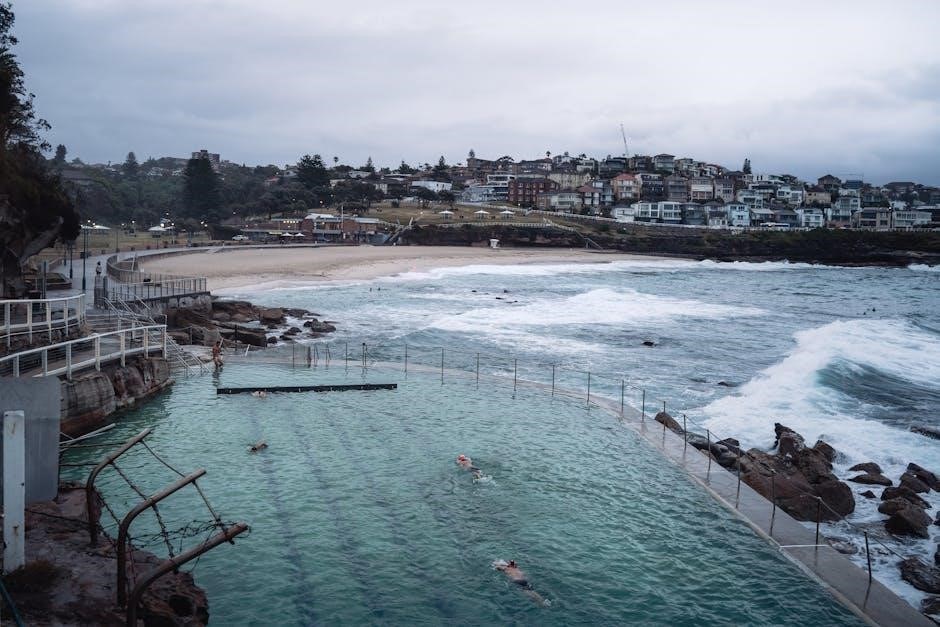
Pre-Installation Inspections
Before installing a residential swimming pool in Massachusetts, pre-installation inspections are mandatory to verify compliance with local building codes and safety standards. These inspections ensure that the selected site meets zoning requirements, and the pool design adheres to electrical and plumbing regulations. Licensed professionals must certify that all components, including barriers and drainage systems, are properly planned and installed. This step is crucial to prevent costly modifications and ensure a safe swimming environment for homeowners and their guests.
Annual Permit Renewal and Compliance Checks
Residential swimming pools in Massachusetts require annual permit renewal to ensure ongoing compliance with safety and health regulations. Local building departments conduct regular inspections to verify that pools meet current standards. Failure to renew permits or pass inspections can result in fines and enforcement actions. Pool owners must maintain proper documentation and address any violations promptly to avoid penalties and ensure a safe swimming environment for all users.
Local Ordinances and Variations
Local ordinances in Massachusetts vary, affecting permit requirements and pool installations, with some municipalities requiring special permits for unique pool setups and enforcing specific standards.
Role of Local Building Departments
Local building departments in Massachusetts play a crucial role in enforcing swimming pool regulations, issuing permits, and conducting inspections to ensure compliance with state and local codes. They review applications, verify designs, and inspect installations to meet safety and zoning standards. These departments also provide guidance on local ordinances, helping homeowners navigate the regulatory process and ensure their pools are legally and safely constructed.
Special Permits for Unique Pool Installations
Unique pool installations in Massachusetts may require special permits, especially for non-traditional designs or larger pools. Local building departments oversee these cases, ensuring compliance with zoning laws and safety standards. Homeowners must submit detailed plans and may need to attend public hearings. Special permits are often required for pools in historic districts or areas with strict land-use regulations, ensuring harmony with surrounding properties while meeting regulatory requirements.

Safety Devices and Equipment
Pool covers and alarm systems are essential safety devices for residential pools in Massachusetts, mandated to prevent accidents and ensure compliance with state regulations.
Pool Covers and Alarm Systems
Pool covers and alarm systems are critical safety devices for residential pools in Massachusetts. These devices must meet specific standards to prevent accidents and ensure compliance with state regulations. Pool covers should be designed to prevent accidental drowning and be capable of supporting the weight of an adult. Alarm systems must detect unauthorized access and alert homeowners promptly. Proper installation and maintenance are required to ensure effectiveness and adherence to safety codes.
Additional Safety Measures for Residential Pools
Residential pools in Massachusetts must implement additional safety measures beyond fencing. Gates must be self-latching and at least four feet high, with alarms to alert of unauthorized access. Clear signage indicating pool rules and depths is required. Regular inspections ensure compliance with safety standards. Properly securing pool chemicals and equipment is also mandated to prevent accidents and maintain a safe environment.

Classification of Residential Pools
Residential pools are categorized as private, public, or semi-public. Private pools are for individual or family use, while public and semi-public pools serve larger groups.
Definition of Private Residential Pools
A private residential pool is defined as a swimming or wading pool established for the exclusive use of an individual, their family, or personal guests. These pools are not open to the general public and are typically subject to specific fencing, safety, and permit requirements to ensure compliance with local building codes and regulations. They must be designed for non-commercial purposes only.
Differentiation from Public and Semi-Public Pools
Private residential pools are distinguished from public and semi-public pools by their exclusive use for an individual, their family, or personal guests. Public pools are open to the general public, while semi-public pools serve specific groups, such as apartment complex residents or club members. Private pools are smaller in scale and subject to unique zoning and safety regulations, unlike larger public or semi-public facilities, which require additional permits and health inspections.
Environmental and Health Considerations
Residential pools must maintain water quality standards, properly dispose of waste, and prevent pollution. Regular maintenance and compliance with health regulations are essential to ensure safe swimming conditions.
Water Quality and Pollution Prevention
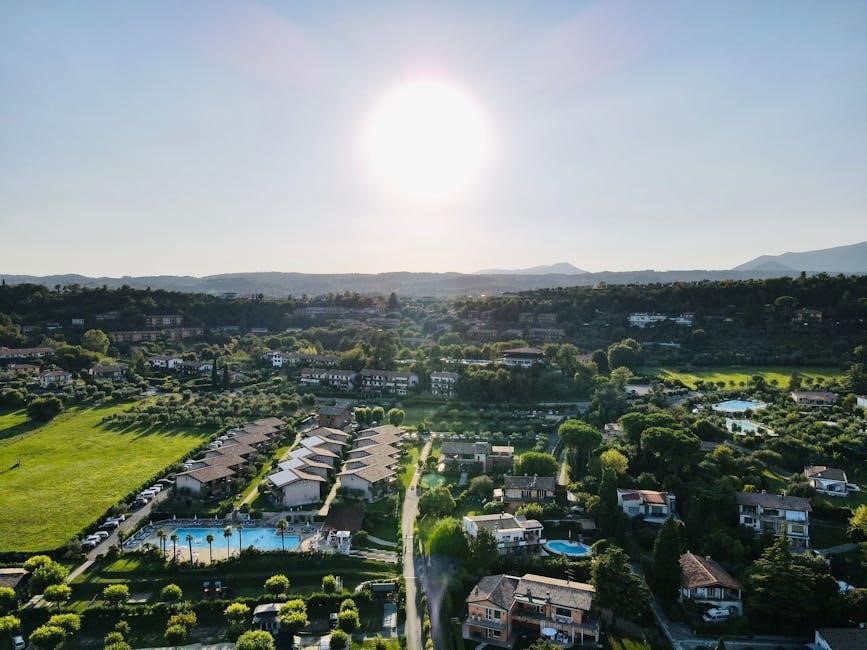
Residential pools in Massachusetts must adhere to strict water quality standards to prevent pollution and maintain safe swimming conditions. Proper waste disposal and filtration systems are required to avoid contaminants. Pool owners must ensure regular testing of water chemistry and implement measures to prevent surface drainage or pollutants from entering the pool. Compliance with local health regulations is mandatory to safeguard public health and environmental safety.
Waste Disposal and Pool Maintenance
Residential pool owners in Massachusetts must ensure proper waste disposal and regular maintenance to prevent environmental contamination. This includes safe disposal of pool chemicals and cleaning materials. Routine maintenance, such as filter cleaning and water testing, is essential to maintain water quality. Proper backwash disposal and adherence to local environmental regulations are required to prevent pollution and ensure sustainability. Regular inspections and compliance checks are recommended to uphold safety and efficiency standards.
Penalties for Non-Compliance
Non-compliance with Massachusetts residential swimming pool regulations can result in fines, enforcement actions, and legal consequences. Violations may lead to penalties, including monetary fines and mandatory corrections. Repeat offenses could escalate enforcement measures, emphasizing the importance of adhering to state and local codes to avoid legal and financial repercussions.
Fines and Enforcement Actions
Violations of Massachusetts residential swimming pool regulations can result in significant fines and enforcement actions. Monetary penalties are imposed for non-compliance, with amounts varying based on the severity of the infraction. Enforcement may include mandatory corrections, legal actions, or even pool closure until compliance is achieved. Repeat offenses can lead to escalated penalties, ensuring adherence to safety and environmental standards. Proper compliance is essential to avoid these consequences.
Consequences of Violating Pool Regulations
Violating Massachusetts pool regulations can lead to severe repercussions, including mandatory corrective actions, legal proceedings, or even pool closure. Non-compliance may result in heightened scrutiny and potential legal penalties. Beyond fines, violations can jeopardize pool usage privileges, requiring costly adjustments to meet standards. Compliance is crucial to avoid these outcomes and ensure safe, lawful pool operation. Adhering to regulations prevents legal and financial complications, safeguarding both property and community interests.
Adhering to Massachusetts pool regulations ensures safety, legal compliance, and property value protection. Proper permits and inspections are crucial for responsible pool ownership and community well-being.
Importance of Adhering to Regulations
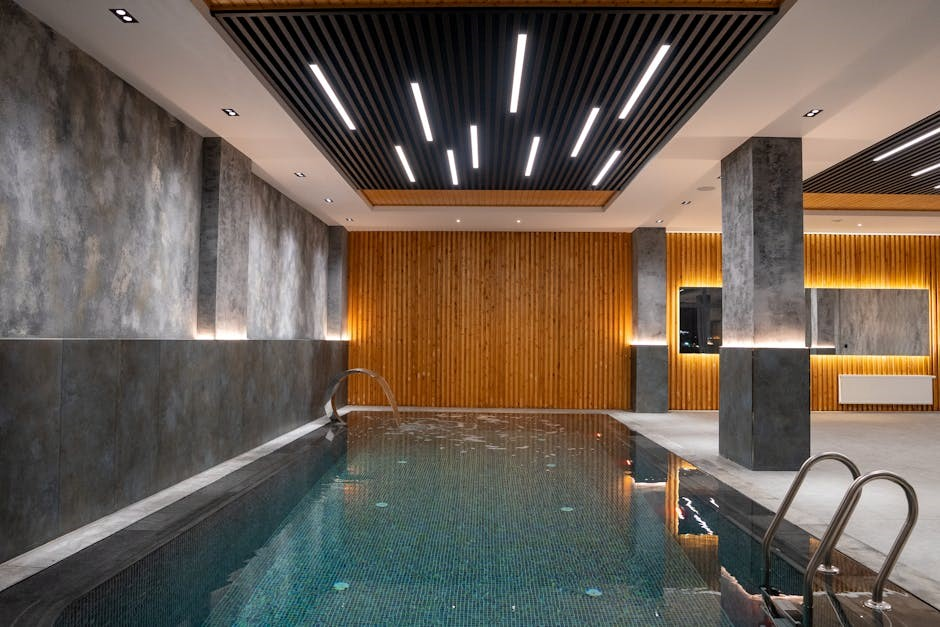
Adhering to Massachusetts pool regulations ensures safety, legal compliance, and environmental protection. Proper permits and inspections prevent accidents, avoid penalties, and protect property values. Compliance also ensures water quality and waste disposal standards are met, safeguarding public health and the environment. Following these guidelines fosters responsible pool ownership and contributes to community well-being.
Final Thoughts on Residential Pool Ownership in Massachusetts
Owning a residential pool in Massachusetts offers recreational and aesthetic benefits but requires careful adherence to regulations; Proper compliance ensures safety, avoids penalties, and protects property value. Staying informed about local codes and maintaining regular inspections are crucial. Responsible pool ownership not only enhances lifestyle but also contributes to community safety and environmental sustainability, making it a rewarding investment for homeowners.